What You Need To Know About Trading Psychology

If you are like me, just hearing someone else talking about Trading Psychology immediately catches your attention.
Well, I'm not here to speak for everyone, but in the early stages of my career, I took a deep dive into this topic in hopes of being a better trader.
(I'll let you know at the end of this blog if what I did worked or not)
Whatever the case is, this is an important topic for all traders, no matter if you just put on your first trade a few minutes ago or have been in the industry for a decade.
There are a lot of things to unpack on this topic, but not everything in the realm of Trading Psychology is as important as you might think.
In this article, I'll let you know exactly what you need to understand and how to overcome the key mental challenges you may have.
Here's What You Will Take Away
1. The Main Emotions That Affect Your Trading.
2. Timing Trades Being A Psychological Issue?
3. Hack To Manage Your Emotions.
4. Goals.
1. The Main Emotions That Affect Your Trading
When I first started researching Trading Psychology, I fell into a rabbit hole, diving into understanding how the brain works, types of fear response, why they happen, etc..
It was an endless pile of information and ways to look at it.
Fast forward a few years, I came to realise understanding all that information doesn't necessarily translate to good trading. But there are things that could indeed help both you and I.
So here's the only thing you need to know to have a good grasp of handling your emotions:
1. Types of Emotions you feel when you're trading.
2. When do those Emotions start kicking in?
1. Type of Emotion you feel when you're Trading.
These are the 3 primary Types of Emotions that a traders feel when they are trading:
A. Sudden Reaction
Ever see a big move from the market after a news release and the feeling of 'I need to do something' regardless of being in a trade or not?
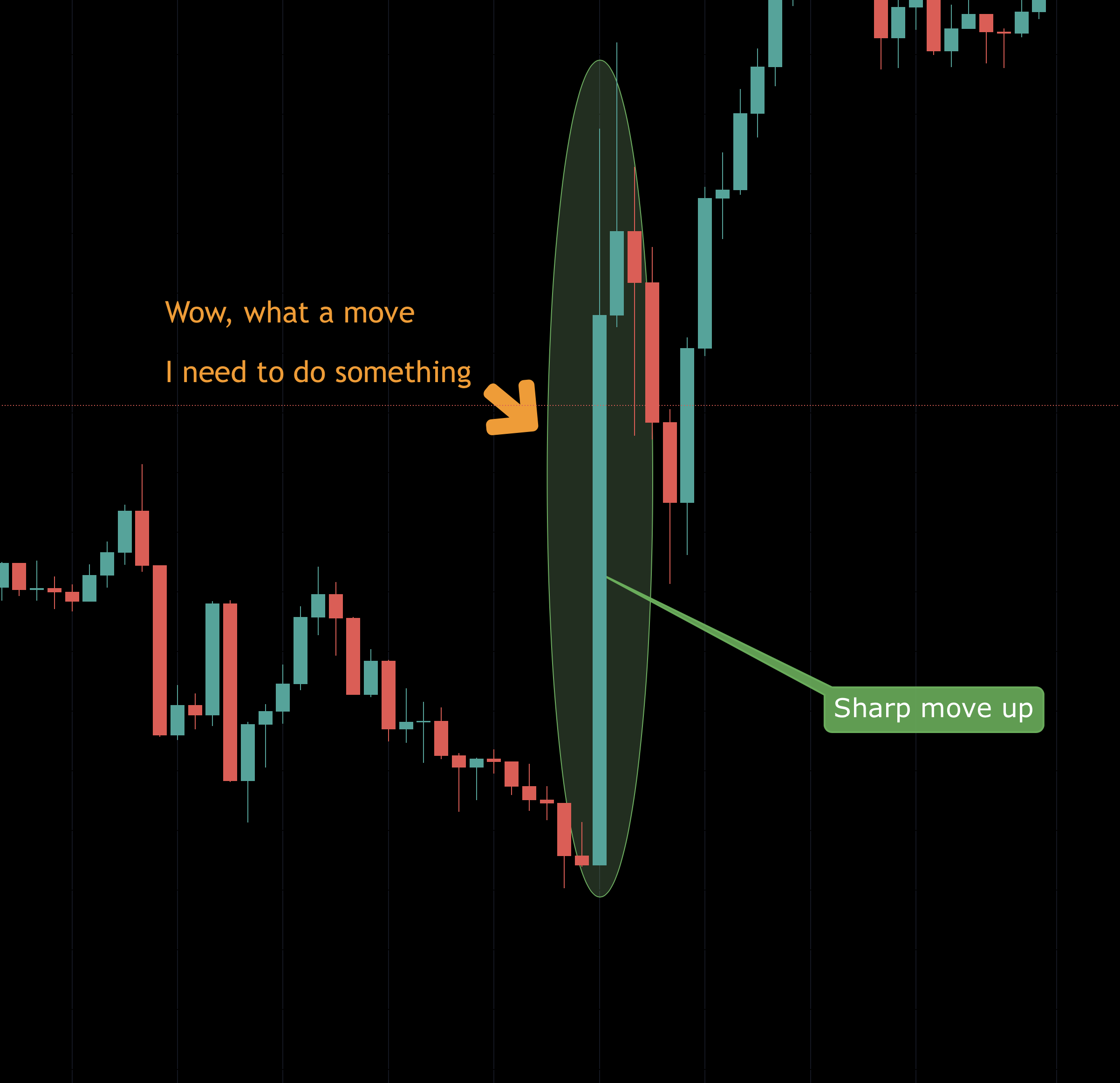
As I'm writing this (May 2021) Doge Coin is going from 0.3 cents to 0.6 cents in 48 hours, this is the type of market moves that gets traders thinking:
'Oh Sh*t, I better do something'
But the reality is, you don't have to do anything, more times than not, it's better to just sit still and react AFTER. After everything has settled.
B. Fear of Missing Out
I always hear the term 'Oh I have FOMO' or 'I have to fix my FOMO', and the list goes on.
Here's a hack, don't try and 'Fix' or understand 'Why' you have FOMO. Instead, study the charts, and try to pick out, where other traders are getting FOMO and take advantage of them instead.
Make it your weapon instead of treating it as your downfall.
Here's an example,
FOMO usually happens when there's a sharp move and traders start chasing it:
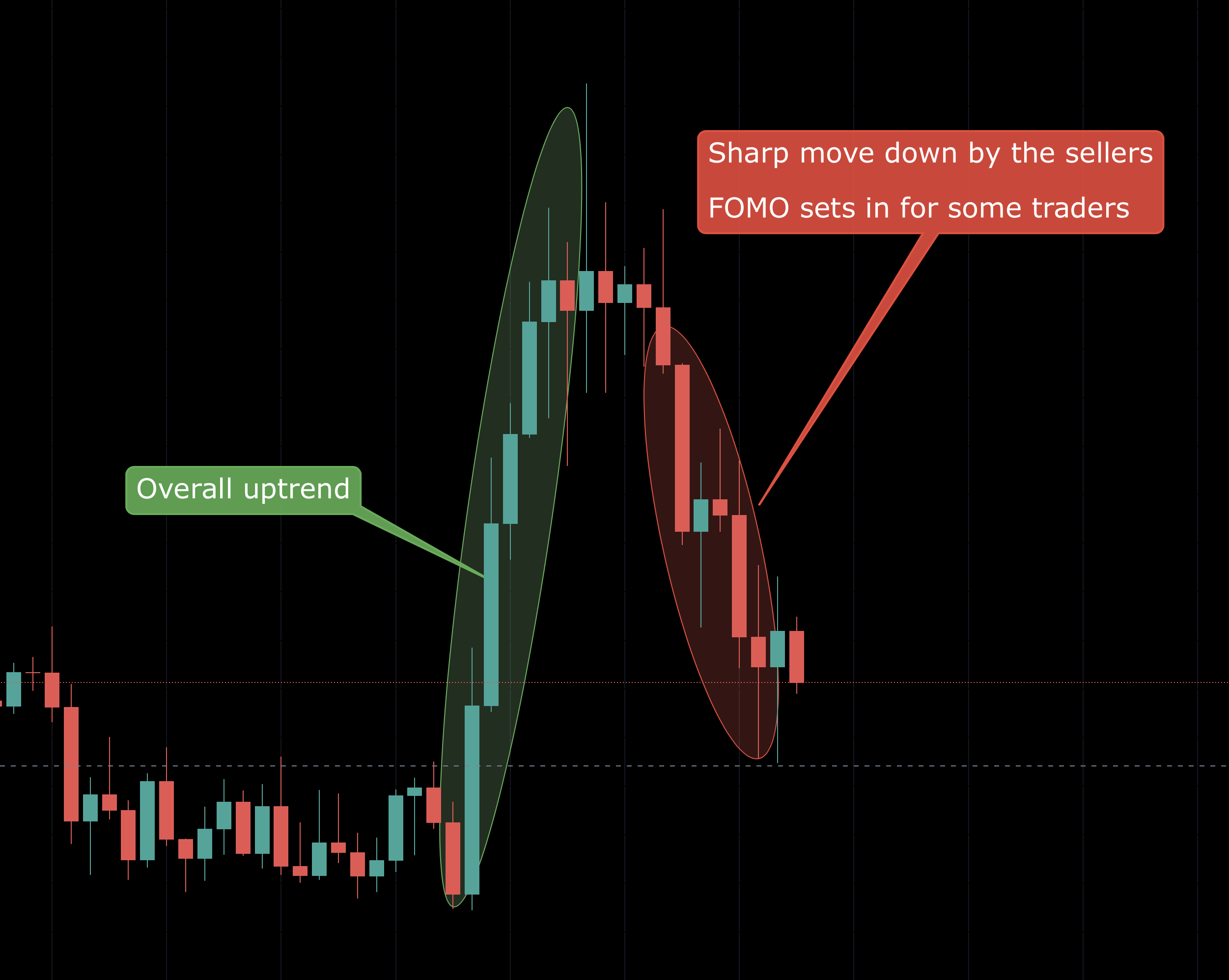
Here, you see sellers trying to pile onto the sell because of FOMO, DESPITE how low prices are already. 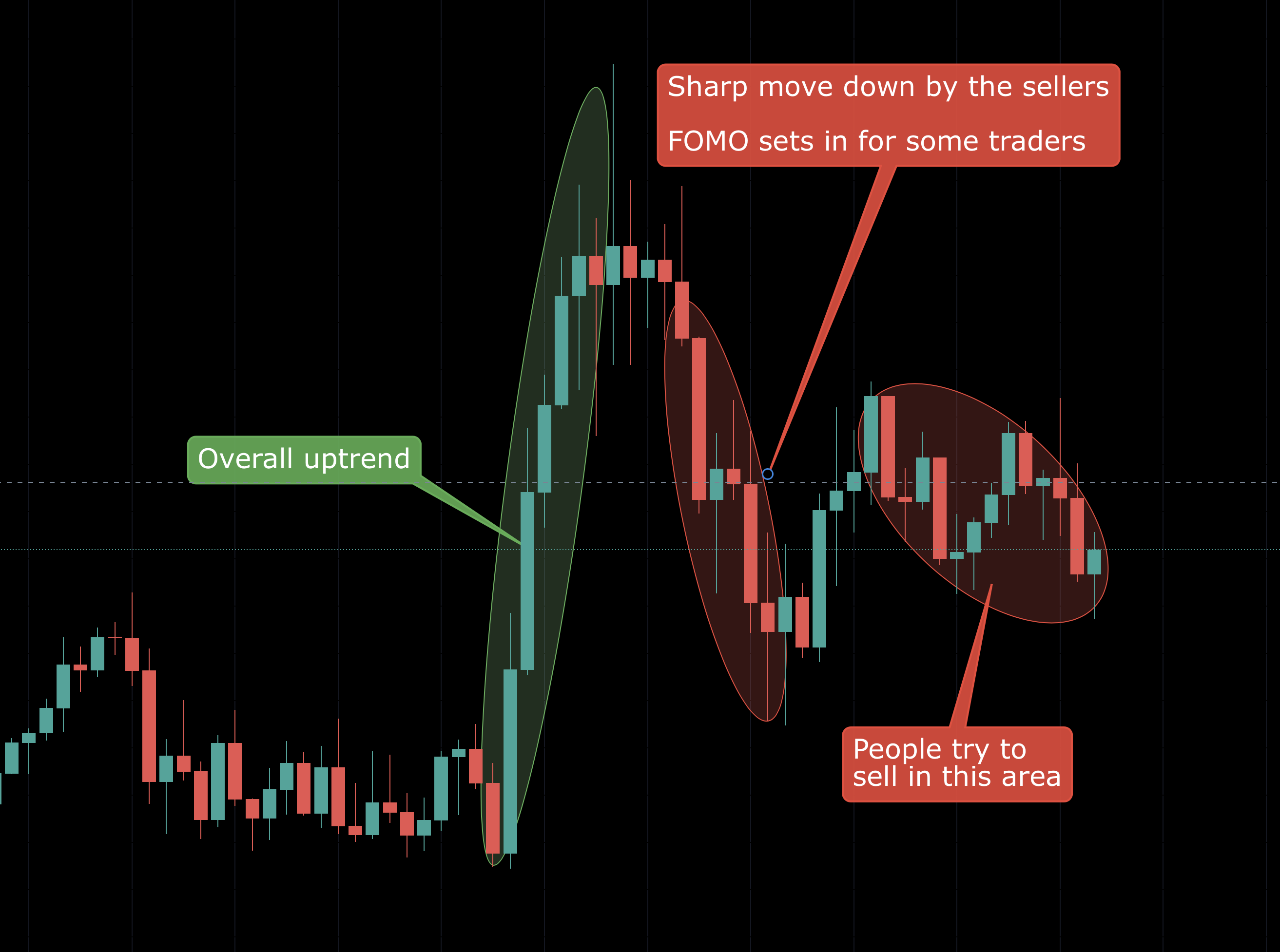
If you are able to recognise that traders there are getting in purely based on FOMO, you wait for price to reverse on them, then go for the opposite direction.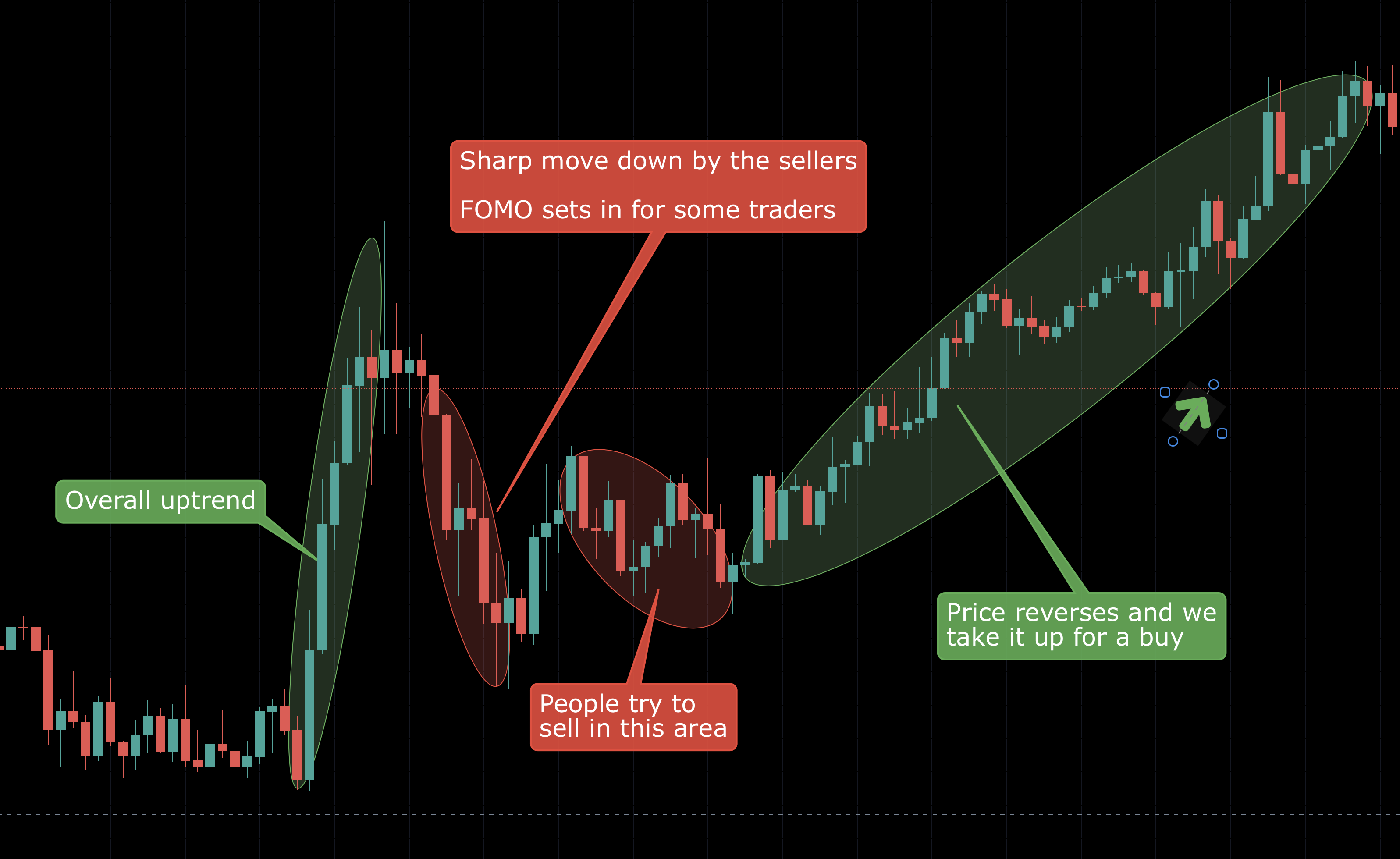
(If you are in the Mastering Price Action 2.0 Program, you'll know exactly what I'm talking about)
C. Greed
This is the best and most entertaining part.
Well, okay, it's only fun and entertaining when it's not happening to you...
Have you seen traders with their trade being in profit for let's say 78 pips, and they go:
'Just 2 more pips, c'mon 2 more pips and I'll walk away with 80 pips profit!' 
The next thing you know, this happens, 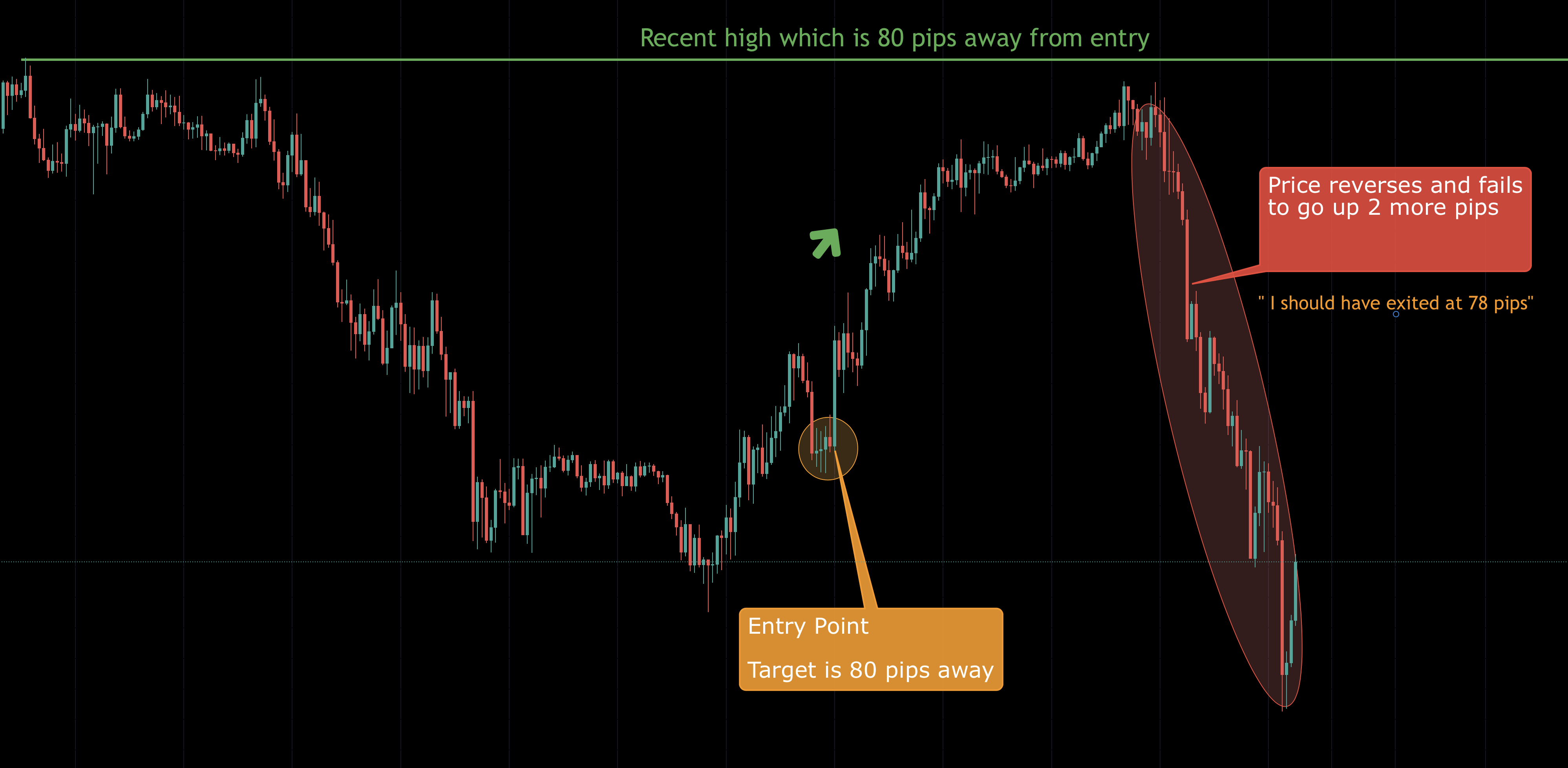
This is plain irrational...
Yes, I understand, I'm guilty of it as well from time to time. But the Goal here is to recognise you have this emotion going on, and if the analysis and plan of the trade has been fulfilled, you take your gains and exit.
2. Timing Trades Being a Psychological Issue?
'I got the direction right, I just need to work on my timing',
Says the person who just got a stopped out and the trade went into the direction they anticipated.
I hear this so much that sometimes I hear it in my dreams. To be fair, I'm guilty of saying this in the past as well.
But here's the conundrum, trying to solve the timing isn't always the solution. To get to the solution, you first need to know the problem, the real problem. And that's generally not Timing.
Education = Expectations
This is the main issue. Because when you are already very well trained on identifying what's happening in the markets. But you could become stubborn and attached to your analysis once it's done. That stubbornness will cost you money.
Ever heard of the term,
'Flow like water'?
That doesn't mean ignoring all our education and trade like a headless chicken. It just means, when a trade analysis is done, and the market is showing that it's not 'ready', you want to stay agile.
Here: 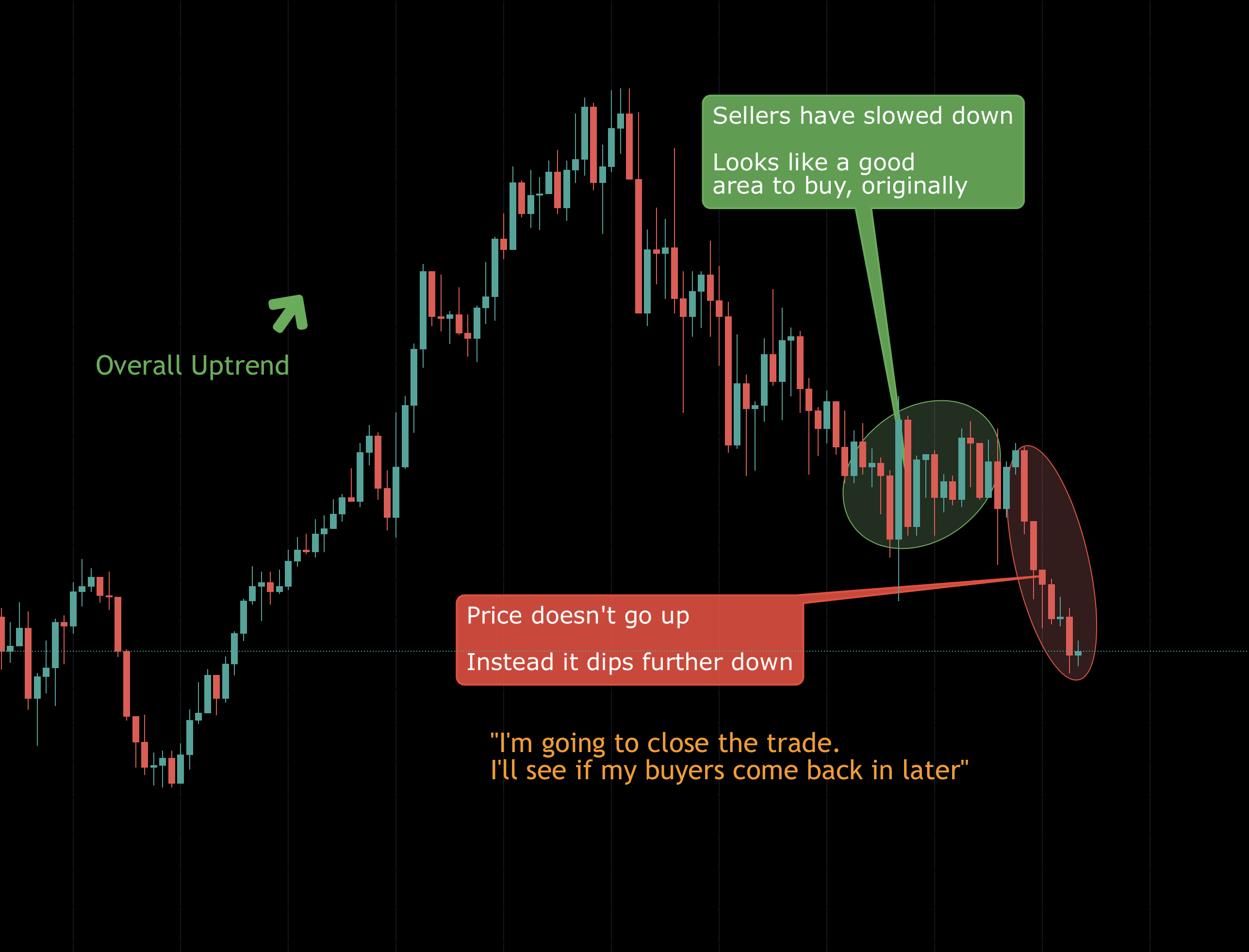

This is an example of using your education, knowing that the market could still be a good buy, but staying agile. Getting out when you feel the trade is not ready and get ready to get back in, if there is an opportunity.
On the flip side, below is the last thing you want to do: 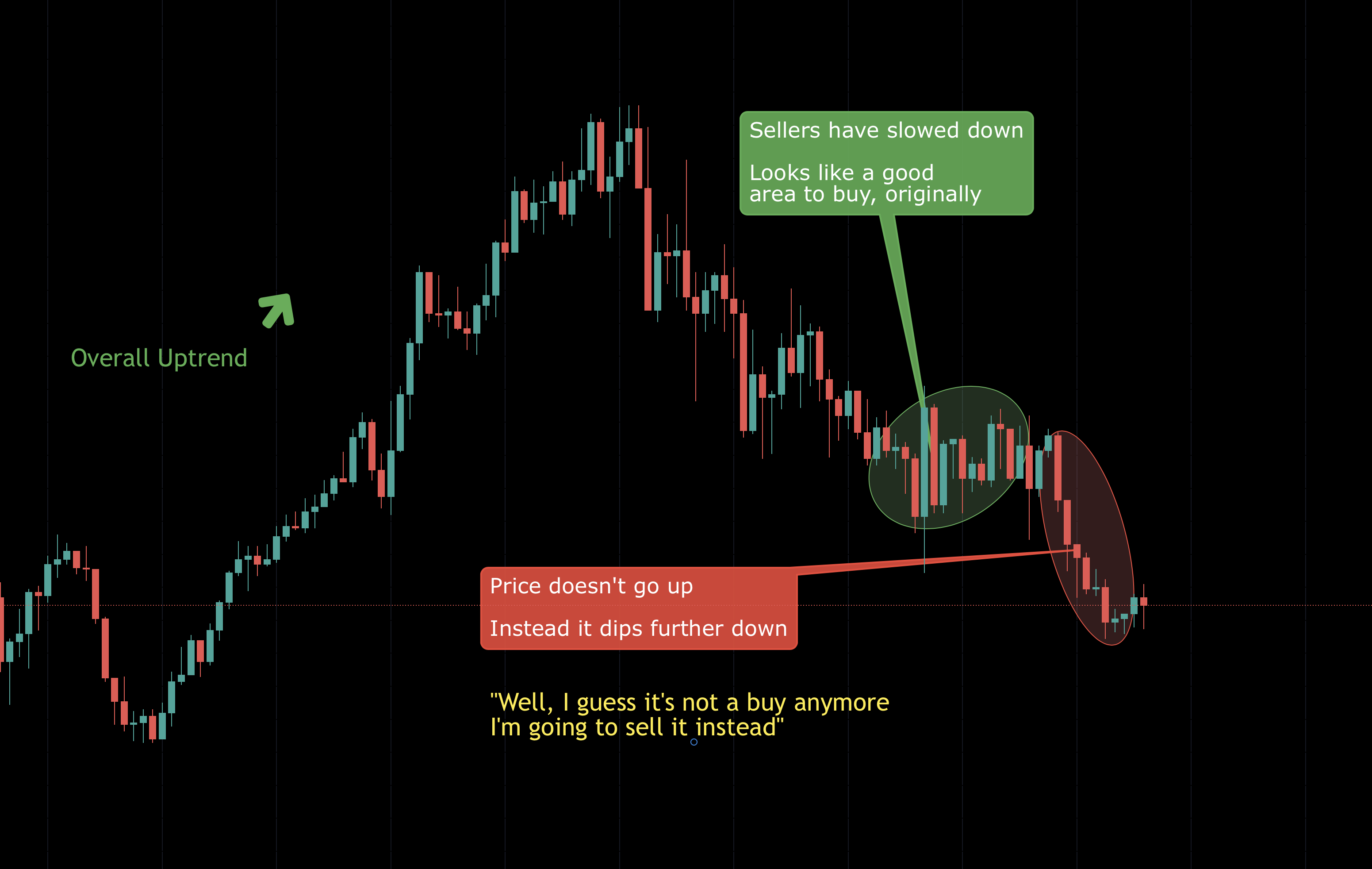
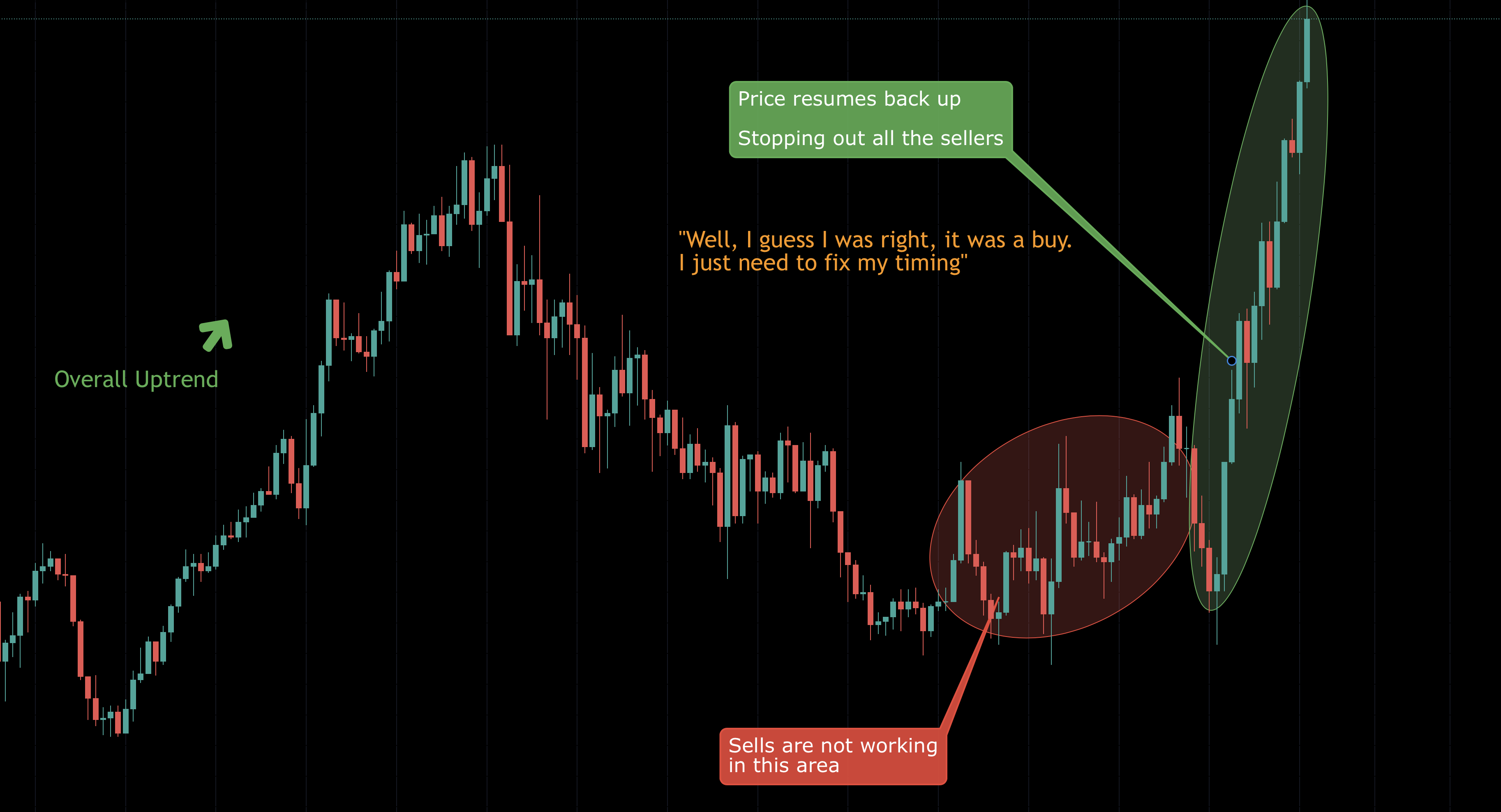
3. Handling your Emotions/Psychology
You may already know when trading emotions usually come to you. It speaks for itself, it happens generally when you are in a trade. Like I mentioned above, any sudden move from the markets will make you feel a certain way.
Now, it's not so much about 'controlling' your emotions. It's more so of being mindful of your emotions and don't act on it if not needed to.
The next question you want to ask yourself is,
'How would I know if I want to act on it or not?'
Very simple:
Have a strong Pre-Analysis. Plan out all the scenarios that could happen PRIOR to taking the trade. Have all the contingency plan needed before getting into the trade, so you do not get 'shaken' out of the trade when emotions start kicking in. 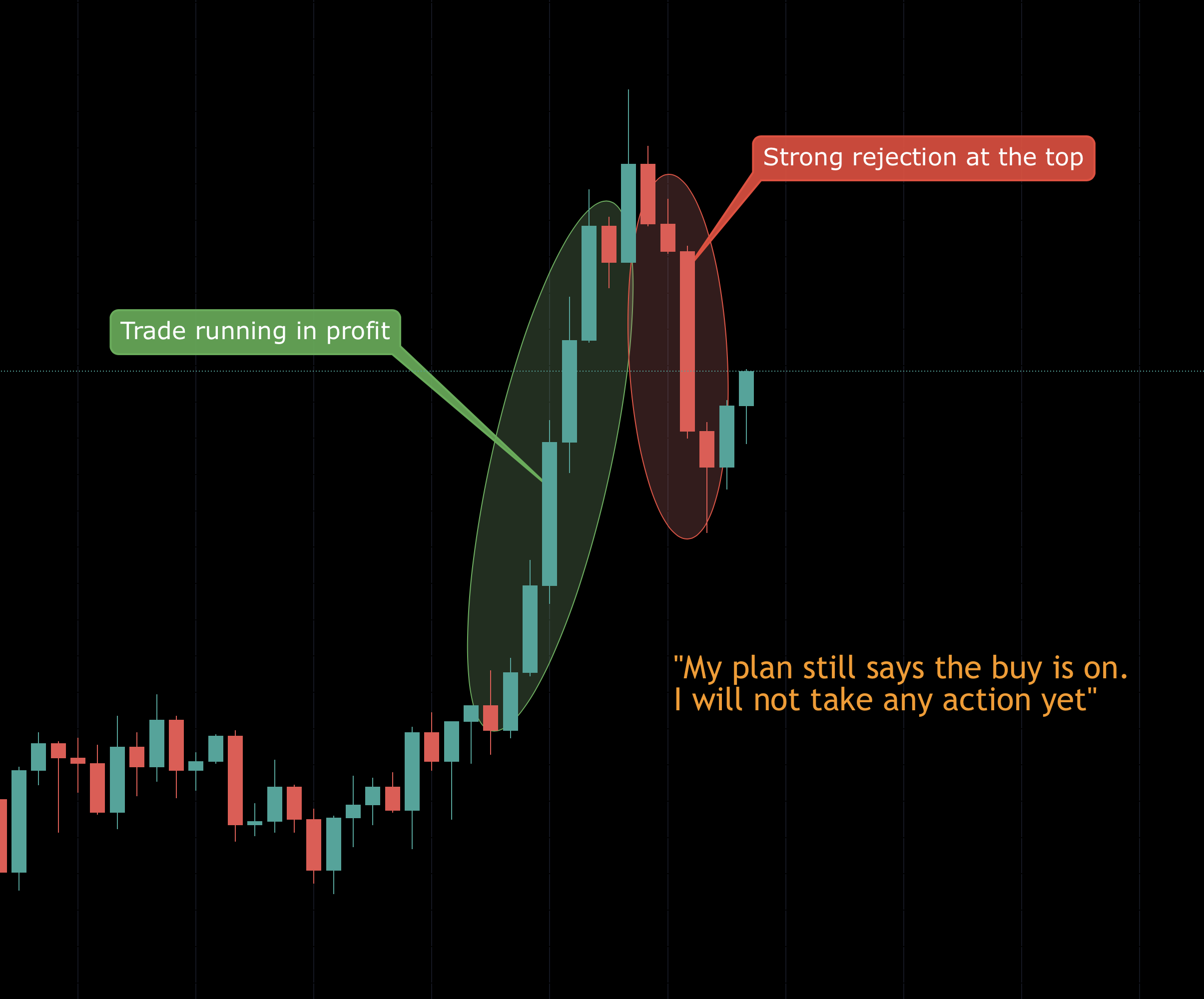
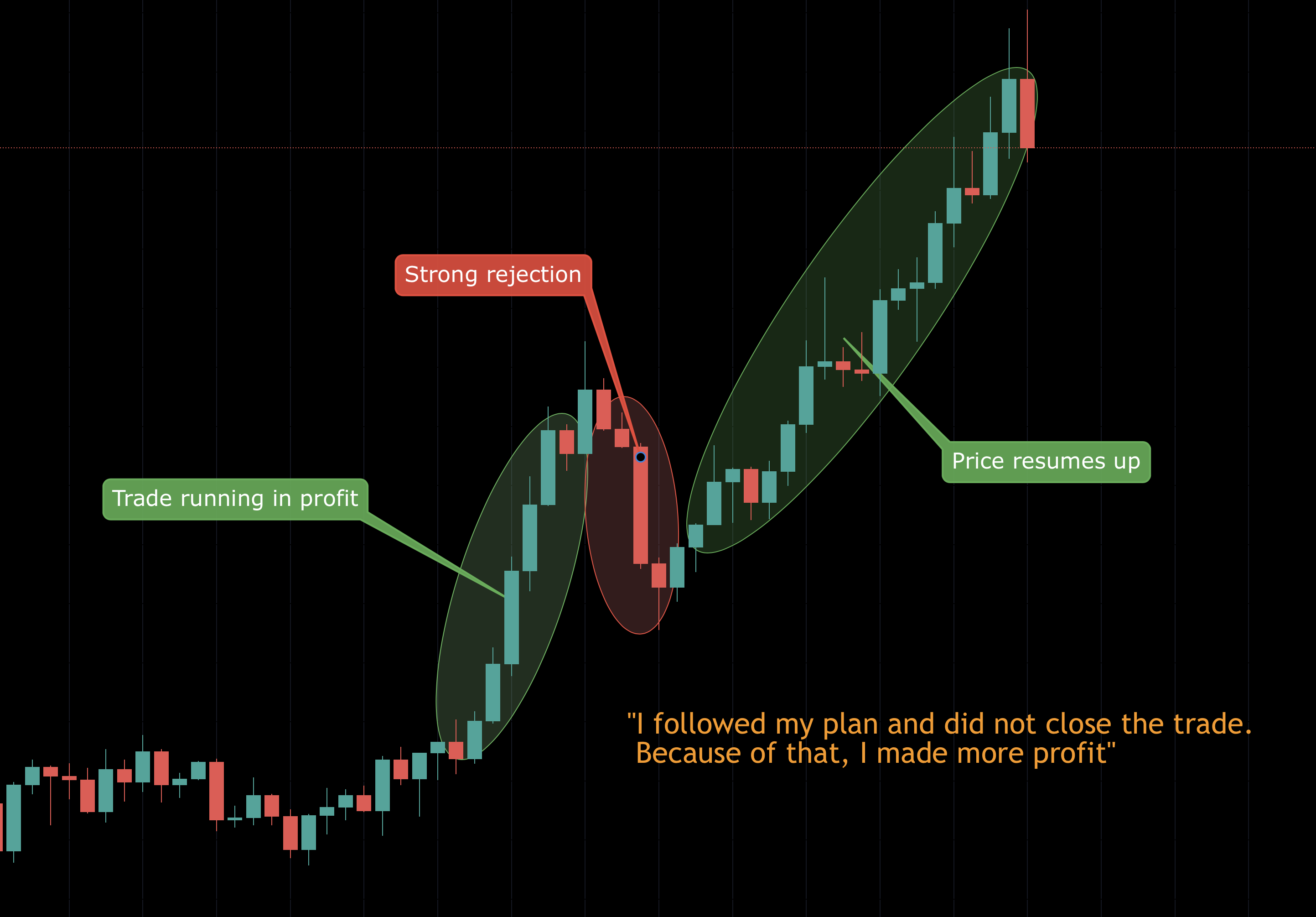
Always follow your plan. If you find that over the long run, your plan doesn't work. Change the plan. If not, follow the plan in your Pre-Analysis.
4. Goals
I want to end this with the most important topic for the blog. Well, it's actually one of the most important topic in life as well.
Goals.
When asked,
'How much do you want to make from trading?'
The majority answer is,
'Enough to get me to be financially free'
That's not really an answer is it?
If you think about it, it's the same thing when you take a trade. You don't want to just make money on a trade, you want to know where you want to exit, how much you are willing to risk, etc.
So, always work backwards. Plan out how you want to achieve your goals. These plans could be something as detailed as:
1. How long do I need to master the concept in the Mastering Price Action 2.0 Program.
2. How long do I need to be on a demo account before going to a Live account?
3. What's my plan coming into each day?
4. What's my plan coming into each trade?
The list can go on and on!
Don't get me wrong, most of what you have planned wouldn't really go as expected to your timeframe, but having a roadmap and goal in mind for your progress will get you to your destination much quicker than being a headless chicken in the markets.
Goals for everything you do will be a self defense weapon, especially when unnecessary emotions come along the way causing mental blocks.
Conclusion.
Now, to answer the initial question I pose in the beginning of the blog, the answer is a little ambiguous.
You don't need to know everything about the brain to manage your emotions in trading.
But you need to have,
1. Understanding of what types of emotions you generally feel when trading.
2. Solid Pre-Analysis.
3. Solid Goals and Plans.
I hope this helps, and as always,
With Pip Love,
Lucas at Urban Forex


